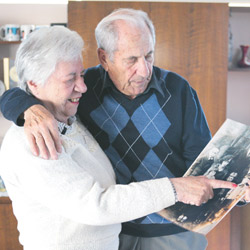A zaida remembers the outbreak of war
PETER KOHN
GRANDFATHER Jack (Yitzchak) Sukiennik, 81, has vivid memories of the first days of September 70 years ago -— a time that changed his life forever.
On September 1, 1939, Nazi Germany invaded Poland, and when a British ultimatum to withdraw went unheeded, Great Britain and its empire declared war on Germany on September 3.
Mr Sukiennik, then 11, remembers the terror that beset Grabowiec, the Polish shtetl where he lived with his parents and five siblings.
“People started to run, coming in from other villages. There was a big panic,” he said this week from his Sydney home.
From the west came news of the German land invasion and air raids, although Grabowiec was not bombed. To the east, the Soviet Union invaded on September 17. Ten days later, Warsaw fell to the Nazis.
“In between were the Poles. I saw some of the Poles throwing away their rifles and running,” he said.
“I remember the Russians coming, and they stayed for around two weeks. Later they retreated back across the River Bug, which became the border between the Soviet and the German zones.”
Mr Sukiennik’s father Nachum, a tailor, decided the family had to flee in the direction of the Russians. He bought a horse and droshky and piled in some possessions.
“He put us six kids and my mother Malka into the cart and he closed up the house. He took his Singer sewing machine. My cousin Zlata, who was 17 or 18 years old, was running after us, wanting to come with us, but her parents wouldn’t let her go because she was an only child. Everyone in our family who stayed behind, they all perished.”
In 1942, the Nazis transported around 1400 Jews from Grabowiec to the Sobibor death camp, said Mr Sukiennik. “Everyone went to the ovens.”
For the Sukienniks, a fateful journey across the Bug, skirting Soviet troops, took the family into the Russian zone.
“The Russians put us in a hostel and registered us. We stayed there a few weeks and they asked us if we wanted to go on to Russia or back into Germany. Those who registered to go back were sent straight to Siberia.
“My father was very clever and said he wanted to work in the mines at Dombas, so they allowed us to come in, and we settled in Russia, in a city called Furmanov.”
Nachum and his older sons were taken to the labour camps, but later, when the Soviets raised a Polish army in exile, they drafted him, and sent him to the front, where he died in combat against the Germans in 1944.
Mr Sukiennik still has a copy of the Polish records he was able to obtain, noting his father’s death in combat.
After the war, Mr Sukiennik travelled back to Poland, but the family feared returning to Grabowiec, which was near Kielce. A pogrom had broken out there against the remaining Jewish population in 1946.
“A cousin of ours was killed in a little town near Grabowiec after the war, when Poles threw a grenade through her first-floor window,” he said.
After a period in Israel, Mr Sukiennik, by then married, was able to join his wife Karoline’s family in Australia in 1959. He became a fitter and turner in Sydney, and the couple today still lives in the North Bondi house that became a haven for the family in their new country.
“Australia is one of the best countries in the world. If a person has their health and can work, they are free to do anything they want with their life.”
Mr Sukiennik’s daughter Ruth Jacobs visited Poland earlier this year to see where her family came from.
On a visit to Europe a few years ago, Mr Sukiennik returned to Grabowiec. He also visited his father’s gravesite near Warsaw. “I stayed only a very short time in Grabowiec. It was very emotional. I looked around, and then I moved on.”
The Jewish Holocaust Centre and Shrine of Remembrance in Melbourne will hold a joint commemoration of the 70th anniversary on Sunday September 6 at the Jewish Holocaust Centre, Selwyn Street, Elsternwick, at 2.30pm.


comments